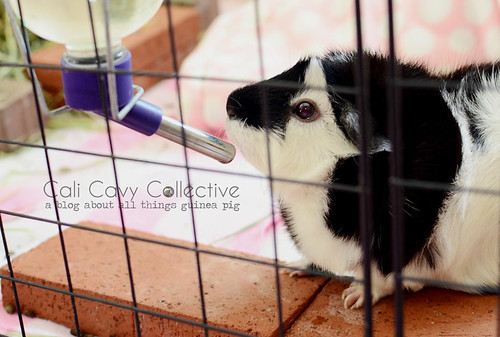Post by nicki on Mar 15, 2015 17:28:54 GMT 10
Hay:
Guinea Pigs should have an unlimited supply of hay available to them at all times. Timothy, Orchard, and Oat hay are very commonly fed. Alfalfa hay should be avoided unless being fed to pups under 6 months of age, pregnant sows or those that have just given birth, as it is very high in calcium. It is usually recommended that it should be mixed in with another every day hay, instead of replacement of hay types that are mentioned above.
Hay is a necessary staple in a Guinea Pigs diet as it aides their digestion and also helps keep their teeth ground.
When selecting a hay it is best to select a hay that is fragrant, not yellowing or turning brown and free of as much dust as possible.
Fresh Fruits and Vegetables:
Guinea Pigs require one cup of fresh vegetables, per pig, per day. Fruits are high in natural sugar content and should not be fed daily. One to two times a week for fruits should suffice.
Pellets:
Some people do not feed their Guinea Pigs pellets at all and just provide the unlimited amount of hay and proper amount of fruits and vegetables mentioned above. But, 1/8 of a cup of good quality Timothy or Alfalfa based pellets, per pig, per day is acceptable.
In lieu of an Alfalfa hay supplement for pups, pregnant and nursing sows, an Alfalfa based pellet will suffice along with their usual hay and fresh foods.

Water:
Guinea Pigs require a constant supply of fresh water. It is recommended to be provided in a small animal bottle rather than a bowl to avoid contamination (Ex. waste, bedding). Their water bottles should be emptied and refilled frequently.

Vitamin C:
Just like humans, Guinea Pigs are incapable of creating their own Vitamin C. They usually do not get a sufficient amount of the vitamin through their pellets and hay and therefore require fruits and vegetables that will also provide it to them. Red Peppers, kale and dark leafy green vegetables are great sources of Vitamin C. Kiwis, oranges, and strawberries are also great sources, but as discussed above, it is best to feed them in small quantities once or twice a week. Oranges are very citrus-y and may cause mouth sores so be sure to feed a very small amount sparingly.
There are Vitamin C supplements for Guinea Pigs who may be ill or have not been eating properly. Chewable tablets and drops meant to be directly administered by mouth are best. There are supplements out there marketed to be put into water bottles but there are some problems with that. One, if a Guinea Pig does not like the taste, it may prevent them from drinking their water. Two, Vitamin C tends to degrade in light, heat and moisture. Because of that, and possible bottle leakage, you can never be sure how much, if any, of the supplement your Guinea Pig may be receiving. The Oxbow company has a Vitamin C chewable tablet specifically for Guinea Pigs, which would be a good way to go if you are concerned your pig may not be getting enough through their diet.


